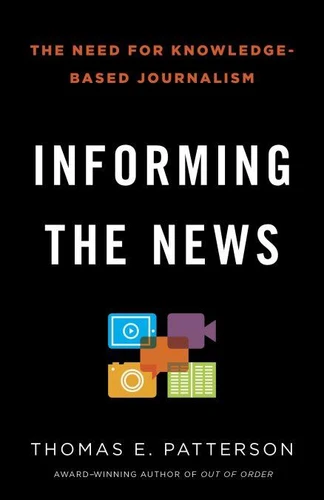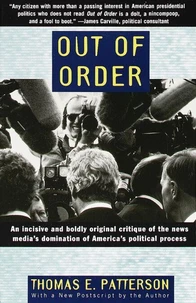Informing the News
Par :Formats :
Disponible dans votre compte client Decitre ou Furet du Nord dès validation de votre commande. Le format ePub protégé est :
- Compatible avec une lecture sur My Vivlio (smartphone, tablette, ordinateur)
- Compatible avec une lecture sur liseuses Vivlio
- Pour les liseuses autres que Vivlio, vous devez utiliser le logiciel Adobe Digital Edition. Non compatible avec la lecture sur les liseuses Kindle, Remarkable et Sony
- Non compatible avec un achat hors France métropolitaine
 , qui est-ce ?
, qui est-ce ?Notre partenaire de plateforme de lecture numérique où vous retrouverez l'ensemble de vos ebooks gratuitement
Pour en savoir plus sur nos ebooks, consultez notre aide en ligne ici
- Nombre de pages256
- FormatePub
- ISBN978-0-345-80661-1
- EAN9780345806611
- Date de parution08/10/2013
- Protection num.Adobe DRM
- Taille2 Mo
- Infos supplémentairesepub
- ÉditeurVintage
Résumé
As the journalist Walter Lippmann noted nearly a century ago, democracy falters "if there is no steady supply of trustworthy and relevant news." Today's journalists are not providing it. Too often, reporters give equal weight to facts and biased opinion, stir up small controversies, and substitute infotainment for real news. Even when they get the facts rights, they often misjudge the context in which they belong.
Information is the lifeblood of a healthy democracy. Public opinion and debate suffer when citizens are misinformed about current affairs, as is increasingly the case. Though the failures of today's communication system cannot be blamed solely on the news media, they are part of the problem, and the best hope for something better. Patterson proposes "knowledge-based journalism" as a corrective. Unless journalists are more deeply informed about the subjects they cover, they will continue to misinterpret them and to be vulnerable to manipulation by their sources.
In this book, derived from a multi-year initiative of the Carnegie Corporation and the Knight Foundation, Patterson calls for nothing less than a major overhaul of journalism practice and education. The book speaks not only to journalists but to all who are concerned about the integrity of the information on which America's democracy depends.
Information is the lifeblood of a healthy democracy. Public opinion and debate suffer when citizens are misinformed about current affairs, as is increasingly the case. Though the failures of today's communication system cannot be blamed solely on the news media, they are part of the problem, and the best hope for something better. Patterson proposes "knowledge-based journalism" as a corrective. Unless journalists are more deeply informed about the subjects they cover, they will continue to misinterpret them and to be vulnerable to manipulation by their sources.
In this book, derived from a multi-year initiative of the Carnegie Corporation and the Knight Foundation, Patterson calls for nothing less than a major overhaul of journalism practice and education. The book speaks not only to journalists but to all who are concerned about the integrity of the information on which America's democracy depends.
As the journalist Walter Lippmann noted nearly a century ago, democracy falters "if there is no steady supply of trustworthy and relevant news." Today's journalists are not providing it. Too often, reporters give equal weight to facts and biased opinion, stir up small controversies, and substitute infotainment for real news. Even when they get the facts rights, they often misjudge the context in which they belong.
Information is the lifeblood of a healthy democracy. Public opinion and debate suffer when citizens are misinformed about current affairs, as is increasingly the case. Though the failures of today's communication system cannot be blamed solely on the news media, they are part of the problem, and the best hope for something better. Patterson proposes "knowledge-based journalism" as a corrective. Unless journalists are more deeply informed about the subjects they cover, they will continue to misinterpret them and to be vulnerable to manipulation by their sources.
In this book, derived from a multi-year initiative of the Carnegie Corporation and the Knight Foundation, Patterson calls for nothing less than a major overhaul of journalism practice and education. The book speaks not only to journalists but to all who are concerned about the integrity of the information on which America's democracy depends.
Information is the lifeblood of a healthy democracy. Public opinion and debate suffer when citizens are misinformed about current affairs, as is increasingly the case. Though the failures of today's communication system cannot be blamed solely on the news media, they are part of the problem, and the best hope for something better. Patterson proposes "knowledge-based journalism" as a corrective. Unless journalists are more deeply informed about the subjects they cover, they will continue to misinterpret them and to be vulnerable to manipulation by their sources.
In this book, derived from a multi-year initiative of the Carnegie Corporation and the Knight Foundation, Patterson calls for nothing less than a major overhaul of journalism practice and education. The book speaks not only to journalists but to all who are concerned about the integrity of the information on which America's democracy depends.





